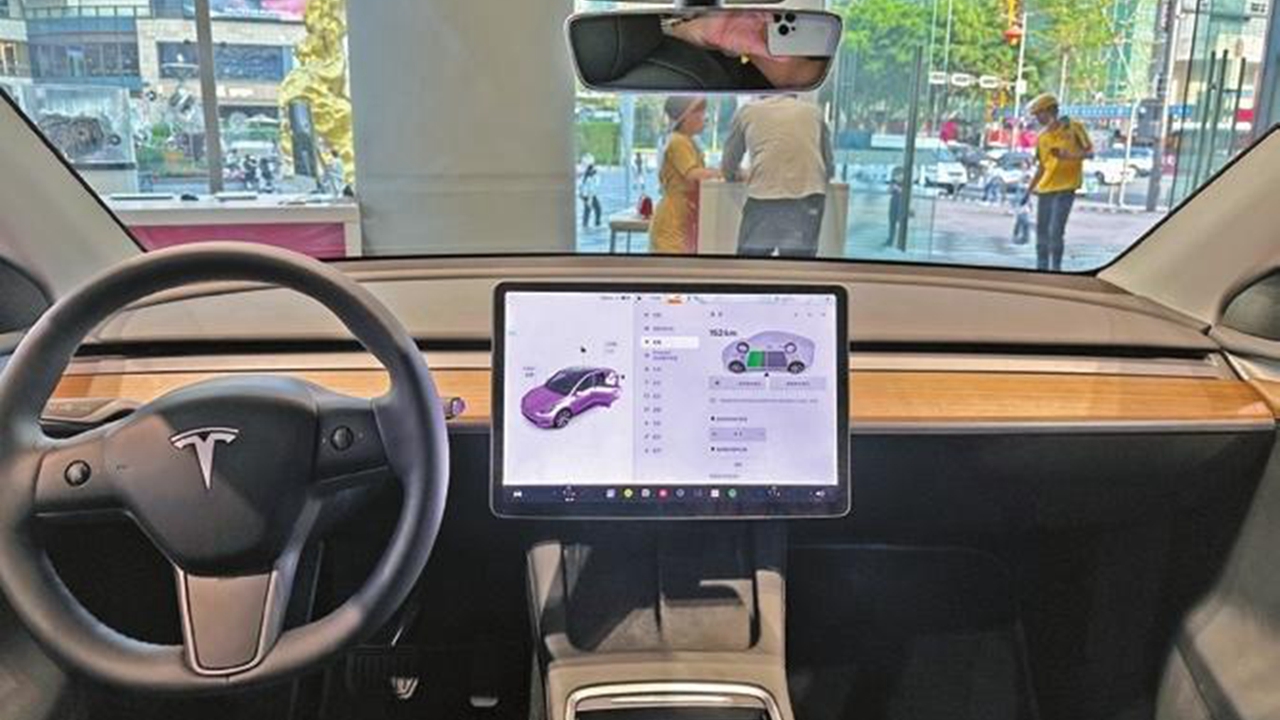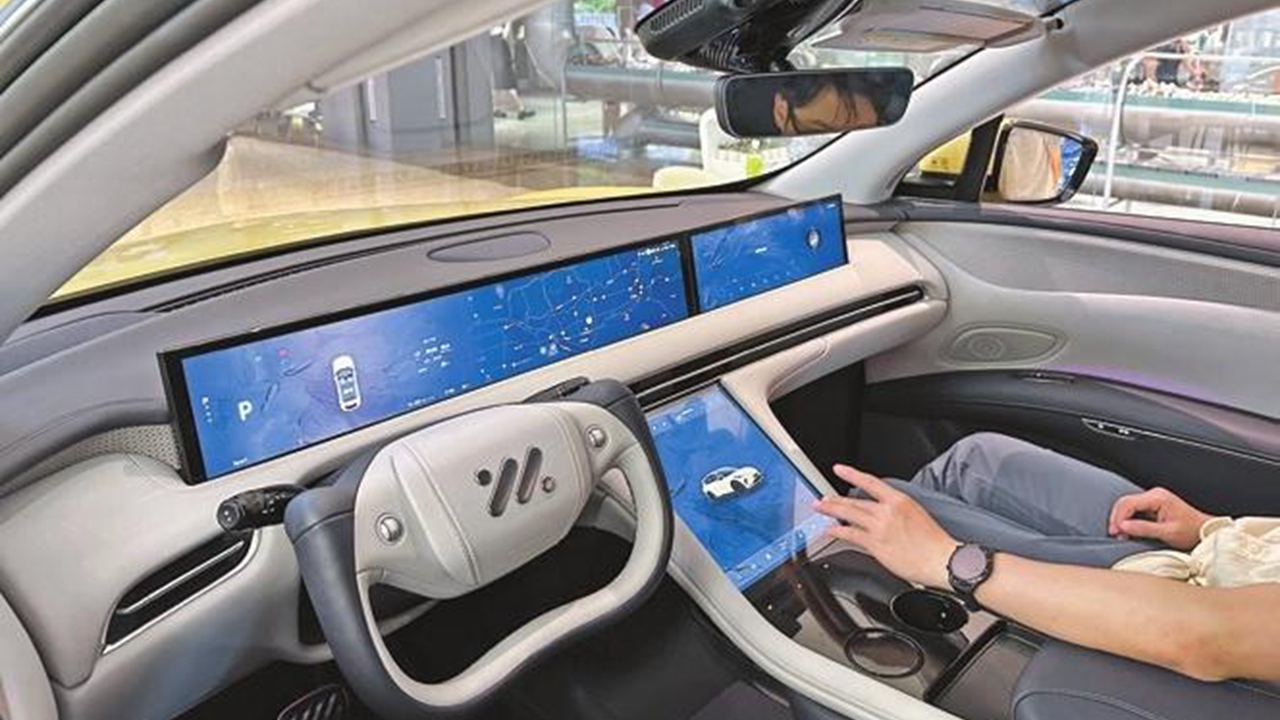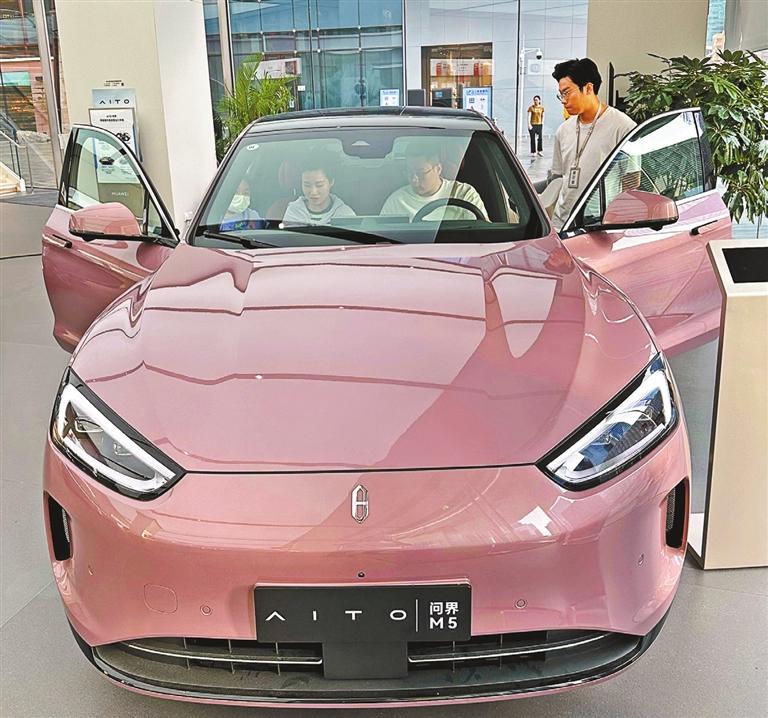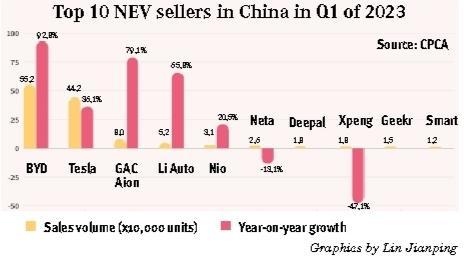Are foreign carmakers losing out in Chinese EV market?
Marco Castelli, an Italian businessman living in Shanghai, tweeted last week: “I saw far less German cars (Audi, BMS, VW, etc.) on the streets of Shanghai. If they don’t adapt fast to the new market, they will be marginalized soon. Chinese customers are not loyal and switch quickly to other brands.”
He is not alone in sounding the alarm for foreign carmakers as Chinese consumers are quickly embracing electric vehicles (EVs) and domestic carmakers are churning out lower-priced, fancier and more feature-loaded EVs than many foreign rivals.
Taylor Ogan, CEO of Snowbull Capital, also has favorable views on Chinese EV brands. “Tesla is no longer elite; it is cheap,” he tweeted Friday, quoting a Chinese friend. In another tweet, he predicted that “BYD will generate more revenue from selling passenger vehicles in China in the next eight weeks than Tesla’s entire revenue from China in 2022.”
Chinese car buyers used to look up to imported brands as they were considered more reliable, durable and stylish than domestic vehicles. For electric cars, this is no longer the norm now that Chinese EV makers are outrivaling their foreign counterparts in the domestic market.
Tesla has been highly successful in the Chinese market in terms of sales volume and brand recognition. However, Shenzhen-based BYD has overtaken Tesla in terms of sales, with the help of less expensive models and plug-in hybrids that offer fuel efficiency while easing drivers’ mileage anxiety over fully electric cars.
Tesla’s share of the Chinese EV market fell by a third from 15% in 2020 to just 10% in 2022, according to data from China Passenger Car Association (CPCA).
For the first quarter of 2023, BYD came first in the sales of new energy vehicles (NEVs) in China, followed by Tesla (second), GAC Aion (third), Li Auto (fourth) and Nio (fifth), according to CPCA. (See chart for the top 10 NEV sellers. Among the top 10, Tesla and Smart are the only foreign brands.)
According to figures released by China Association of Automobile Manufacturers, BYD sold 1.86 million NEVs in China in 2022, outnumbering Tesla, which recorded sales of 711,000 EVs in the country.
BYD has now become the biggest NEV maker in the world, but only when accounting for its sales of both fully electric and plug-in hybrid models. Tesla remains the global leader in terms of sales of fully electric cars.
Catering to local consumers
Chinese NEV makers have been more innovative in integrating new technologies into vehicles, such as entertainment features, digital connectivity, NCA (navigation cruise assist) features and voice-activated controls, than Tesla and well-known foreign brands of internal combustion engine vehicles who are also rolling out EVs of their own, according to auto commentators.

The cockpit of a Tesla Model 3.
Tesla cars are jokingly nicknamed maopifang, or “bare-shell apartments,” by Chinese consumers because their simplistic cockpits have fewer entertainment and amenity features than domestic brands.
While Tesla remains the bellwether of EV makers globally, it is now facing the hard question of how it can stay ahead of the competition in China, analysts say.

Zeekr cars, Geely’s new electric vehicle marque, are displayed at One Avenue in Futian District on Sunday. Photos by Lin Min
Compared with car owners in other countries, many Chinese consumers place higher priority on new in-car technologies that bring comfort and entertainment to them. Li Auto’s L9, a range extender SUV launched last year, is equipped with a mini-refrigerator, a screen for front-row passenger seat, a ceiling screen for second-row passengers and a “queen’s seat” that allows the occupant to stretch his or her legs, in addition to driver-assistance features and a combined range of 1,315 km on a single charge with a fully filled 65-liter fuel tank. As a result, L9 was regarded by many as the ultimate car for naiba — fathers who are actively involved in the care and upbringing of their children — and became a hit.
Li Qisheng, an overseas returnee who works in an investment firm in Shenzhen, said he was considering buying an EV and would choose from emerging Chinese EV makers such as Geekr, Li Auto and Nio because he thought their products are more stylish and intelligent. Previously a Tesla fan, he gave up the idea of buying a Tesla after comparing the cockpits of a Tesla Model Y and Li Auto’s L7.

The cockpit of a Zhiji Motor's IM sean.
Many young Chinese consumers regard cars as “big toys,” rather than just a means of mobility. Chinese EV makers have gone to great lengths in developing entertainment features. Nio’s ET7 is equipped with PanoCinema, a panoramic and immersive digital cockpit boasting augmented-reality (AR) and virtual-reality (VR) technologies.
Although still having a large following in China, Tesla has yet to design its products specifically tailored to Chinese consumers’ preferences. In addition to unimpressive cockpit features, it offers a limited mix of models. In comparison, BYD offers more than 60 different versions of fully electric and plug-in hybrid cars, covering almost all price ranges and all types of passenger vehicles.
Lower prices and good battery packs are also some reasons that Chinese consumers favor domestic brands, analysts say. Chinese NEVs have high-performance battery packs that can only be found in premium models available in overseas markets.
Troubles for traditional automakers
EVs built by traditional international premium brands such as BMW and Audi have failed to impress Chinese car buyers. BMW recently slashed the prices of its iX3 pure electric SUV by as much as 140,000 yuan (US$20,374). Despite the hefty price cut, the model received an unimpressive 3,864 orders in March, according to icauto.com.cn.
BMW’s electric vehicles, despite boasting satisfying maneuverability, reliability and high brand recognition, lag behind Chinese competitors in terms of software systems and interior designs, many users said on Xiaohongshu, the Chinese equivalent of Instagram.
Toyota, once a global auto leader but now seen as an EV laggard, launched its first EV, bZ4X, made with Chinese partners in October last year. Although Toyota lowered its price by as much as 60,000 yuan, the model, dubbed by many Chinese netizens as yanzhengma because bZ4X looks exactly like a verification code sent to your mobile phone, has reported less than 8,000 units sold by the two joint ventures so far. Unimpressive battery pack performance and cockpit design were frequently listed by many Xiaohongshu users as reasons why bZ4X turned potential buyers away.

A family takes an interest in an Aito electric car, which uses Huawei software and intelligent features.
China an NEV leader
After more than a decade dishing out subsidies, China has let NEV makers to stand on their own feet. Competition, innovation and sustainability-minded consumers are now driving the Chinese car market, according to analysts.
When China rolled out the red carpet for Tesla to build a factory in Shanghai in 2018, many were pessimistic about Chinese carmakers. But the move is now deemed a brilliant decision as it forced domestic carmakers to compete directly with an industry leader.
China’s NEV sales nearly doubled to 6.89 million units last year, making 2022 the eighth consecutive year in which China was the world’s largest market for NEVs, according to official figures. For comparison, the U.S. only sold about 800,000 EVs in 2022. In 2022, a quarter of newly purchased cars in China were NEVs while EVs accounted for only about 5% of new car sales in the U.S. last year, according to autoevolution.com.
The infrastructure for NEVs in China has also been improved markedly. As of the end of 2022, there were 5.21 million charging piles and 1,973 battery changing stations in the country.
Domestic EV makers going global
Chinese NEV makers are also making inroads into overseas markets, with over 78,000 NEVs shipped to foreign destinations in March, growing 390% from a year ago, according to the China Association of Automobile Manufacturers.
Cutthroat competition will force Chinese NEV makers to continue innovating and lowering prices, analysts say. Although facing a litany of challenging issues such as disputes over warranties, trade barriers, maintenance and repair, different tastes for design and in-car features in overseas markets, leading Chinese EV makers are expanding beyond the domestic market.
BYD announced in September 2022 it would open its first wholly invested passenger car factory outside China in Thailand. The company has also unveiled plans for EV exports to countries such as Brazil, Australia, Singapore and Norway.
On Thursday in Shanghai, visiting Brazilian President Luiz Inácio Lula da Silva met with Wang Chuanfu, founder and chairman of BYD, which is in talks to start operations at a factory in the Brazilian state of Bahia that the previous owner, Ford Motor Co., shuttered in 2021.
On the other hand, Hozon, a Chinese EV startup, is making its foray into Jordan after it launched its overseas campaign in August 2022, making Thailand its first international market. It now has three models available in the Middle East, Southeast Asia and Europe, according to China Daily.
BYD, Geely and Dongfeng have all reported growing EV sales in Israel. BYD’s Atto 3, which only started to be delivered in Israel in October, is now the best-selling EV in the country.
Foreign brands making new efforts
Chinese consumers have a fast-growing appetite for NEVs. A survey by Nielsen IQ at the end of 2022 found 39% of Chinese respondents said they were very likely to choose an EV when they buy the next car, while 89% said they were likely to do so.
The huge Chinese market remains attractive to foreign carmakers, which have seen their EV sales surge in China although such increases were eclipsed by leading Chinese rivals.
Volkswagen, China’s best-selling international carmaker, revealed at the annual China EV 100 Forum in Beijing early this month that it would invest 15 billion euros (US$16.3 billion) in e-mobility with its Chinese partners by 2024, according to a China Daily report.
Stefan Mecha, CEO of Volkswagen China Passenger Cars Brand, said at the forum: “I have never seen a country develop as quickly as China. The momentum of transformation towards e-mobility in China is unstoppable.” In 2022, Volkswagen’s EV sales in China soared 68% year on year.
Volkswagen brought its luxury brands, including Porsche, Bentley, and Lamborghini, to the third China International Consumer Products Expo in Hainan last week as global luxury carmakers have set their sights on the Chinese market.
Global automakers are launching dozens of new EVs at this week’s Shanghai auto show. BMW said it will present the biggest-ever lineup of NEVs at the Shanghai auto show from today to April 27. It will offer 11 electric models in China, its largest market worldwide, at the show.
Chinese and foreign automakers are competing to roll out faster, more luxurious and more feature-drenched EVs in China, the technology’s biggest, most crowded market, AP reported Sunday.

BYD leads NEV innovation
Shenzhen-based BYD is now leading NEV innovation in China. According to its 2022 annual report, BYD held over 27,000 patents under the Patent Cooperation Treaty and had almost 70,000 R&D employees as of the end of last year. The company unveiled a smart vehicle control system April 10, which it says is the first of its kind in the world. The system, called Yunnian, can greatly improve the vehicles’ stability and thus enhance comfort for drivers and passengers while they brake at high speeds, or go over the bends and cross bumpy roads. A video released by BYD shows that a sedan featuring the system does not lose its stability even when it has only three tires left.
In March 2020, BYD unveiled its blade batteries, named after their thinner structure, which have structural advantages that give them features such as a longer life and a higher mileage. The blade batteries are also safer, with BYD reporting no fire or explosion from the tests, where they were crushed, bent, heated in a furnace to 300 degrees Celsius, and overcharged by 260%.